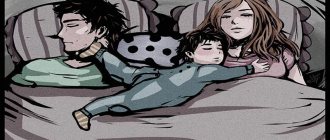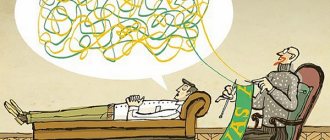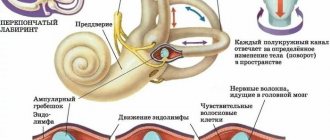Anxiety is a negative mood with feelings of restlessness, tension and fear. In moderation, such emotions are useful: they help mobilize strength and find a way out of extreme situations. But there must be a reason for concern and normally it lasts for a limited period of time.
If a person constantly experiences feelings of anxiety and worry for no reason, this may indicate the presence of a mental disorder. In the absence of help, constant stress wears out the nervous system and the body as a whole, which leads to a breakdown of adaptation mechanisms and the development of chronic diseases.
If you notice that you cannot relax for a long time, then you should think about visiting a specialist.
In pathological cases, a state of anxiety and restlessness for no reason is manifested by both mental and physical symptoms.
Mental symptoms:
- constant feeling of fear and excitement for no reason,
- poor concentration and attention,
- sleep disorders,
- emotional lability, irritability, tearfulness,
- inability to relax and fully engage in daily activities or communication,
- need to reassure other people that everything is okay. At the same time, words of support do not bring relief.
Physical symptoms:
- rapid breathing and heart rate,
- headaches, abdominal and heart pain,
- increased sweating,
- eating disorders: increased appetite or loss of appetite,
- weakness,
- trembling, chills,
- stool disorders: frequent urge, constipation,
- feeling of lack of air,
- nausea,
- muscle spasms and pain.
Unreasonable anxiety and restlessness intensify or subside from time to time. Exacerbations often accompany stress: conflicts, important events, illnesses. Normally, a person quickly recovers after the situation is resolved, but when upset, negative emotions do not go away.
The intensity of anxiety varies from mild to severe. The extreme is panic. If you ignore an anxious state for a long time without a reason, then panic attacks may join it. They strike unexpectedly and sometimes without a good enough reason, but after this episode the person begins to avoid situations similar to the one in which this happened: public transport, an elevator, or just a crowd of people. This greatly reduces quality of life and can lead to social withdrawal.
Causes of unreasonable anxiety and worry
The onset of anxiety disorder is influenced by heredity. It has been discovered that certain brain structures and features of biological processes play an important role in the occurrence of fear and anxiety. Personality characteristics, physical health problems, lifestyle and various types of addictions also matter. Sometimes causeless anxiety and worry have no reason. Negative feelings usually have a trigger—an event or thought that triggers an anxious response. However, most people are unaware of their triggers and believe their emotions are unfounded. In this case, only a specialist will help you understand why anxiety occurs for no reason.
There are a number of diseases whose symptoms include constant anxiety. With unreasonable fear and anxiety, the reasons may be as follows:
- Generalized anxiety disorder: persistent nervousness and worry about small things that are usually visible to others and last for 6 months or more. Begins in adolescence and intensifies with age.
- Obsessive-compulsive disorder: obsessive thoughts and fears that are accompanied by compulsive actions that do not bring relief. There is obsessive-compulsive neurosis - a person is indomitably haunted by memories that reproduce a traumatic situation.
- Phobias: irrational fear of any, even mundane, things. Accompanied by uncontrollable panic and physical manifestations.
- A panic attack is a painful and sudden attack of panic, which is accompanied by a fear of death and vivid somatic symptoms. Regular occurrence of panic attacks means the development of panic disorder.
- Post-traumatic stress disorder: occurs after a severe traumatic situation and is accompanied by high levels of anxiety, avoidance and flashbacks.
These are the most common examples, but pathological anxiety can be a symptom of other disorders or a consequence of unsuccessful management of stress. If you want to understand why you feel anxious for no reason, you should consult a doctor. Without finding out the main factor and working on it, it is impossible to restore health and mental balance.
How anxiety manifests itself - the main symptoms
Everyone is different, and anxiety is different for everyone - it can have emotional, psychological or physical symptoms. It has been noticed that the anxiety in the soul from the manifestation of physical symptoms only intensifies.
Psychological and emotional symptoms include:
- sleep disorders;
- excitement in anticipation of future events; it seems that all troubles, troubles, disasters are directed against you;
- inability to concentrate and concentrate due to unreasonable anxiety;
- constant feeling of anxiety and bad premonitions;
- groundless obsessive fears, even if their inconsistency is clear;
- irritability and increased nervousness;
- panic attacks and depression.
Physical symptoms of anxiety may include:
- loss of appetite;
- weaknesses;
- dizziness;
- headache;
- vomiting;
- frequent urge to urinate;
- increased sweating;
- unknown pain in the chest;
- weakening of sexual feelings;
- breathing disorders;
- muscle spasms and muscle pain.
What to do if you have causeless anxiety and worry
It's hard to live in constant stress. If you are experiencing causeless anxiety and fear, the following list will tell you what to do:
- Talk to someone you trust. This could be a relative, a close friend, a psychotherapist or a helpline employee. People are social creatures, so communication is a good way to relieve internal stress.
- Find a way to calm down quickly. There is not always someone nearby with whom you can share. Therefore, it is important to find a suitable method that will help you relax: breathing techniques, soothing music, aromatherapy, self-massage and more. If you cannot independently choose a technique that quickly helps with anxiety for no reason, a specialist will tell you what to do.
- Add physical activity to your life. It is a natural and effective remedy for anxiety. Moderate exercise relieves tension, reduces stress hormones and strengthens the nervous system. Get at least 30 minutes of exercise every day.
- Normalization of lifestyle. Get enough sleep, eat well, give up bad habits. This stabilizes physical performance and neurotransmitter levels, which helps maintain emotional balance.
- Start keeping a journal. Taking notes can help you identify patterns of anxiety flare-ups, understand the causes, and spot early signs of them. Also, thanks to this, you will begin to focus more on positive events that you may not have noticed before.
When worried for no reason, everyone who regularly encounters this wants to know what to do. There is no universal method, but the 5 steps listed above are recommended for every person with increased anxiety. This may be enough to alleviate symptoms. But if self-help techniques do not give the desired effect, then if you regularly experience anxiety for no reason, you need to find out what to do from a specialist.
How I learned to be present here and now
The second professional I saw specialized in something called cognitive behavioral therapy, or CBT. This woman, whose ticking wall clock drew me into a new form of madness, provided us with the “tools” we needed to be “present.”
I spent most of my life hiding or looking for distractions to avoid anxiety. When I put my phone down and immersed myself in the laughter of my children, or focused on the food I was preparing for my family, my feelings became different. I realized how much I had missed by worrying about everything. Jokes. Interesting points. All those warm and fuzzy feelings that disappear if you don't catch them when they come. That's why I felt so empty - because anxiety took away my ability to enjoy anything.
I won't lie. This type of therapy still requires a lot of effort, dedication and the ability to overcome discomfort on my part. I didn’t notice the results right away and at times I was unhappy with myself when I failed to be “present” in every moment of every day. I'm trying to break a lifelong cycle, which of course cannot be achieved in one evening. Now that I found myself hiding from my feelings, I refocused my energy in the best way for me. Sometimes I succeed. Sometimes I fail. But at least I'm trying to do something.
I can't say exactly when my way of thinking started to change. It didn't happen on any specific day, but it was probably a chain of events that led to it. As I sat on the floor with my son, I heard him—really heard him—in a way I had never heard him before. His eyes turned out to be deeper, his small hands that I held in my hands were etched into my memory.
I saw my past and how much time I had lost. I looked into the future and decided that anxiety would no longer take me a single second. And I absorbed the current moment as a wonderful gift. The time that I live on this earth is not a given, and one day I will leave. I looked at my son and thought: How do I want to spend my time here? Stressing about every little thing or enjoying life?
Advertising
Where does it come from?
A panic attack always occurs against a background of general nervous tension.
Firstly, these are internal problems, self-doubt, fear of loneliness, various addictions (alcohol, drugs, medications), life circumstances.
Secondly, the so-called interpersonal sphere - problems with loved ones, sexual partners, wives, husbands. And also – unjustified expectations, resentment, disappointment in a partner and much more.
And finally, the professional sphere – problems at work, preoccupation with one’s career, success, workaholism.
Experts say that women suffer from panic disorders more often than men. Moreover, the risk of getting sick depends not only on gender, but also on age. Most often, the disorder develops in so-called “young adults” – 20-25 year olds.
The characteristics of the nervous system also influence. Those who have a tendency to easily change the “mode” of the autonomic nervous system are more susceptible to panic attacks. Such people quickly blush, sweat, they often feel dizzy from excitement, stuffiness, overwork, and their heart rate easily increases during physical and emotional stress.
Personality characteristics of a person also play a significant role. Thus, in anxious people, panic disorder is more common than the average population. However, anxiety is not a direct path to panic attacks. We are talking only about predisposition.
There is also a certain “nepotism” here. If there are those in the family who suffer from panic attacks, then the risk of getting sick in other family members is higher.
How to treat?
If attacks occur more than two or three times a month, you should consider visiting a psychotherapist. This visit will not have any consequences in the form of registration.
A combination of psychotherapy and medication is used to treat panic disorder. In the first stages, the doctor usually prescribes sedatives and antidepressants that reduce anxiety and calm the nervous system. Such medications have a cumulative effect, the effect begins on the third or fourth day of use, the result lasts for more than seven days.
But the main work begins later, with a psychotherapist. The main cause of panic disorder is psychological conflicts that do not find a way out. And they are unconscious, and therefore cannot be resolved by a person for some reason. That’s when the psychotherapist helps the person bring the conflict to the surface and work through the situation.
You are not alone
In another powerful attempt to straighten my mind, I joined an anonymous support group. Having gone far beyond my own comfort zone, I found in others what I lacked myself: acceptance, as in the old prayer for wisdom and patience. To my right sat a mother who had lost her son. On the left is an elderly widower; he still carried a photograph of his beloved wife in his pocket.
The Circle of Trust taught me that anxiety comes in many different guises, for many different reasons. New circumstances forced me to return my thoughts to the first psychotherapist and to the anxiety scale. Compared to those who had suffered bereavement and whose anxiety reached a ten, mine seemed to stop at a five. But in that room filled with so many strangers who knew the deep pain, numbers didn't matter.
Anxiety is blind.
You can be the world's richest tycoon or live in the slums; You can be the most popular person in your circle or have no friends at all. You may have experienced many losses or none at all. Anxiety knows no bounds, and what is one point for one person may be a ten for another, so empathize with those around you.
Most of the time, you don't know that someone is fighting this demon until you start questioning them. Or, in my case, until you see me in a support group, find my thumb in the “anti-stress stone” or notice how I slowly wind up in line at the supermarket.
If anxiety is consuming your brain like it is mine, I want you to know that you are not alone. You may feel like your body and mind are stuck in the middle of a tornado. You may feel like everyone is looking at you and talking about you. That you are a strange or different person, or that there is something wrong with you. You can wonder whether this will ever end, whether there is a last item on the list of possible disasters. You may even fear that you will never regain control of your stolen brain. Anxiety wants you to believe all the bad things because if you don't, it will lose its power over you.
Here is the seed sown. That's a lie.










